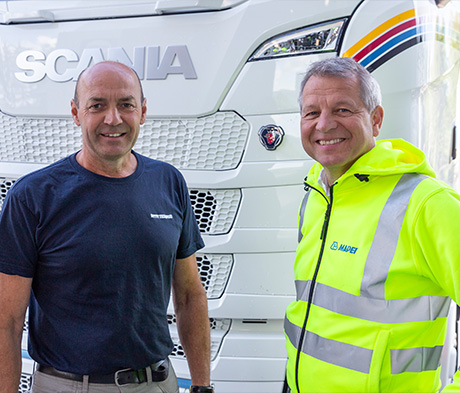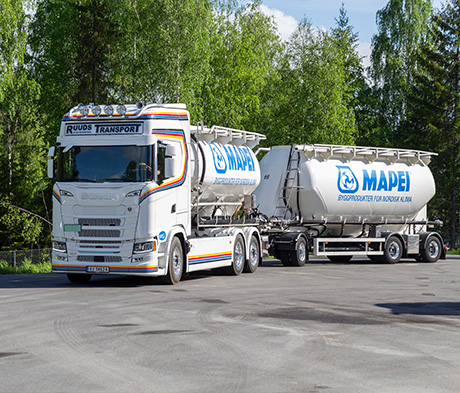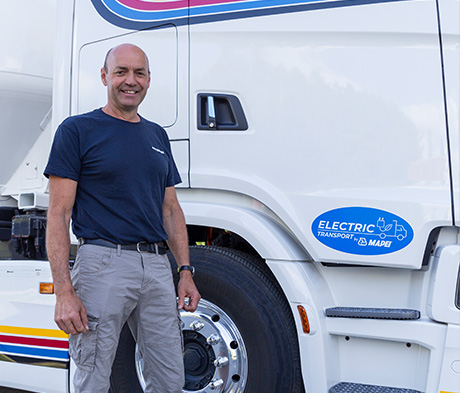 - This is an important day for Mapei. We aim to reduce the climate footprint as much as we can, and an important part of that is reducing the climate footprint of transport, says Mapei Norway CEO Trond Hagerud
- This is an important day for Mapei. We aim to reduce the climate footprint as much as we can, and an important part of that is reducing the climate footprint of transport, says Mapei Norway CEO Trond Hagerud
Ruuds Transport and Mapei, who started the dialogue on electric transport in autumn 2021. Today, two years later, Ruuds Transport has set up 11 charging posts at several locations and the first three electric trucks will be delivered in 2024. Since Ruuds Transport has fixed points for both loading and unloading, fast chargers were built at the Mapei factory and at a raw material supplier. In addition, there are two fast chargers and six regular chargers at Ruud's own facility, so that the electric trucks can be easily charged and ready to drive.
- With such good charging options, in addition to the existing infrastructure along Norwegian roads, we see that we will manage for quite some time to come, even when we acquire more electric trucks, says Knut Ruud.
Higher capacity than before

The truck manufacturer Scania is an important partner and has developed new electric trucks with a battery capacity of 624 kWh. This is the third generation of battery technology. With that capacity, the trucks can transport 50-60 tonnes for 20-25 miles without having to recharge.
- We have chosen to wait until this generation of batteries was ready so that we can cover the transport distances better, says Knut Ruud.
In the construction industry, it is of course incredibly important that products arrive at the right time. This entails somewhat more logistics planning on Mapei's part, but the customers will not notice this to any great extent.
Competitive advantage
Both Mapei and Ruuds Transport see an increased demand for solutions for sustainable construction projects, and being able to offer fossil-free transport is therefore seen as an important competitive advantage. Not least, they both believe that by offering fossil-free transport you can perhaps challenge some old truths.
 - We have already been out on a test trip with a total weight of 60 tonnes where we drove 18.9 miles with two deliveries and came back with 33% capacity, says Ruud.
- We have already been out on a test trip with a total weight of 60 tonnes where we drove 18.9 miles with two deliveries and came back with 33% capacity, says Ruud.
As more people become aware of the benefits of electric transportation, they hope that the benefits will increase over time.
Battery development controls further growth
- I believe that within three to four years there will be a completely new type of battery, a form of super battery. When they are in place, the possibilities for electric transport over longer distances will change completely, says Knut Ruud.
Currently, this initiative is the first on the Nordic market to offer completely fossil-free transport, with heavy loads and over 150 kilometres. The vision is to get both customers and competitors to invest more in this type of transport by showing what is possible already today.
- In addition to this car, we have 2 more on order, which we expect to be delivered during 2024, says Knut.
The collaboration with Scania has also been important for Ruuds Transport, and they have been helpful with, among other things, configuration of the charging infrastructure. Scania was also interested in seeing how the car handled the distance to our sand supplier, which gives them valuable information for further development.
Sustainable strategies

The investment in zero-emission transport is one of the pillars of Mapei's sustainability strategy. This venture gives us the opportunity to deliver our products and solutions with fossil-free transport to fossil-free construction sites in Norway and Scandinavia. For Ruuds Transport, this is about being one of Norway's leading transport companies while fulfilling their own sustainability initiatives.
The first Scania electric truck delivered to Ruuds Transport will transport raw materials to the factory in Nord-Odal and finished product to Oslo municipality's clean water project, where they have a 100% fossil-free construction site.
- I believe in the electric future, concludes Knut.
 - This is an important day for Mapei. We aim to reduce the climate footprint as much as we can, and an important part of that is reducing the climate footprint of transport, says Mapei Norway CEO Trond Hagerud
- This is an important day for Mapei. We aim to reduce the climate footprint as much as we can, and an important part of that is reducing the climate footprint of transport, says Mapei Norway CEO Trond Hagerud The truck manufacturer Scania is an important partner and has developed new electric trucks with a battery capacity of 624 kWh. This is the third generation of battery technology. With that capacity, the trucks can transport 50-60 tonnes for 20-25 miles without having to recharge.
The truck manufacturer Scania is an important partner and has developed new electric trucks with a battery capacity of 624 kWh. This is the third generation of battery technology. With that capacity, the trucks can transport 50-60 tonnes for 20-25 miles without having to recharge. - We have already been out on a test trip with a total weight of 60 tonnes where we drove 18.9 miles with two deliveries and came back with 33% capacity, says Ruud.
- We have already been out on a test trip with a total weight of 60 tonnes where we drove 18.9 miles with two deliveries and came back with 33% capacity, says Ruud. The investment in zero-emission transport is one of the pillars of Mapei's sustainability strategy. This venture gives us the opportunity to deliver our products and solutions with fossil-free transport to fossil-free construction sites in Norway and Scandinavia. For Ruuds Transport, this is about being one of Norway's leading transport companies while fulfilling their own sustainability initiatives.
The investment in zero-emission transport is one of the pillars of Mapei's sustainability strategy. This venture gives us the opportunity to deliver our products and solutions with fossil-free transport to fossil-free construction sites in Norway and Scandinavia. For Ruuds Transport, this is about being one of Norway's leading transport companies while fulfilling their own sustainability initiatives.